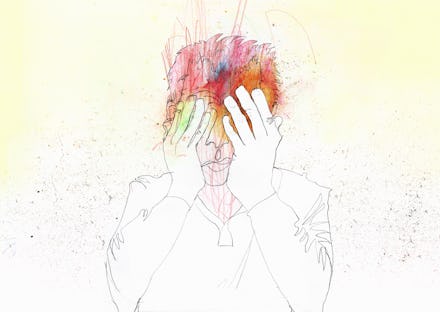The best way to deal with anxiety, according to experts

For many of us, holing up in an effort to practice social distancing made the novel coronavirus pandemic way more real — and scarier, too. And now, stuck at home with no one but ourselves, and maybe a fur baby, family, or S.O., we have fewer outlets than usual for our anxiety. The Internet seems to be urging us to escape it, through everything from live-streaming happy hours and dance parties, to creating a travel vision board and crafting. Yet mental health experts say we also need to learn to "sit with" our anxiety. But what does being with our anxiety mean, and why should we be doing it?
“We feel anxious when we feel like we can’t control something,” Tess Brigham, a marriage and family therapist in San Francisco, tells Mic. Most of us are on edge now, whether or not we have a formally diagnosed anxiety disorder, because so much about this pandemic lies beyond our control — whether an older, immunocompromised loved one will become infected, whether we’ll make rent if our job isn’t compensating us for not coming in, when it’ll all finally end.
Most of us are on edge now, whether or not we have a formally diagnosed anxiety disorder, because so much about this pandemic lies beyond our control.
Brigham explains that when we’re anxious, especially if we’re not used to managing our anxiety, we tend to swing between two extremes: avoiding our anxiety by distracting ourselves through, say, stress-baking or binge-watching Netflix; or diving deep into it, tumbling down a rabbit hole of ruminating and circular thinking. One of Brigham’s clients, for instance, worried that working from home would make their manager suspect them of slacking off, which would cause them to lose their job, and how could they possibly find a job in a pandemic-weakened market?
Being with our anxiety means finding a happy medium between these extremes. Getting there is a matter of, first and foremost, accepting that we feel anxious. When anxiety creeps in, we often deny our feelings, or shame ourselves for having them, reasoning that other people have it worse, Brigham says. She recommends instead acknowledging that we feel anxious about the situation, without judgment, and telling ourselves that it’s ok and understandable to feel this way. Accepting our anxiety then allows us to process it and feel our feelings.
Once we’ve accepted and processed our anxiety, we can evaluate what’s within and beyond our control, Brigham says. We can’t control the fact that a crisis is going on, or that the world as we know it is changing. But we can control how we respond to these larger forces within our own lives. If we can work from home, we can create a workspace and structure our days. And we can find healthy outlets for our anxiety, like doing at-home workouts or getting fresh air.
Brigham adds that it’s also helpful to reassure ourselves that we’re doing what we can with what we have. If we’re worried about job security, for instance, we can remind ourselves that we’re staying in constant communication with our boss over Gchat and that we’re still submitting our assignments on time. This can help nudge us away from the all-consuming anxiety rabbit hole.
Being with our anxiety, is “a hard balance,” Brigham says, and it’ll likely take practice. But it’s an important skill to learn, especially now. Otherwise, our bodies enter fight-or-flight mode, causing parts of our brain to shut down, including the frontal lobe, which is responsible for reasoning and decision-making, she explains; our decision-making becomes irrational and fear-based as a result. It could cause us to lash out, or buy more than we need, leaving little behind for more vulnerable groups. Avoiding our anxiety isn't sustainable, either. Research shows that suppressing our emotions may be associated with various health issues, such as lowered immunity and premature death.
Since it’s unclear how long this pandemic will last, we might as well allow the anxiety it will inevitably continue to trigger to just exist. No amount of Zoom happy hours will make it disappear. We'll all be the better for learning to sit with it, now and when the crisis subsides.